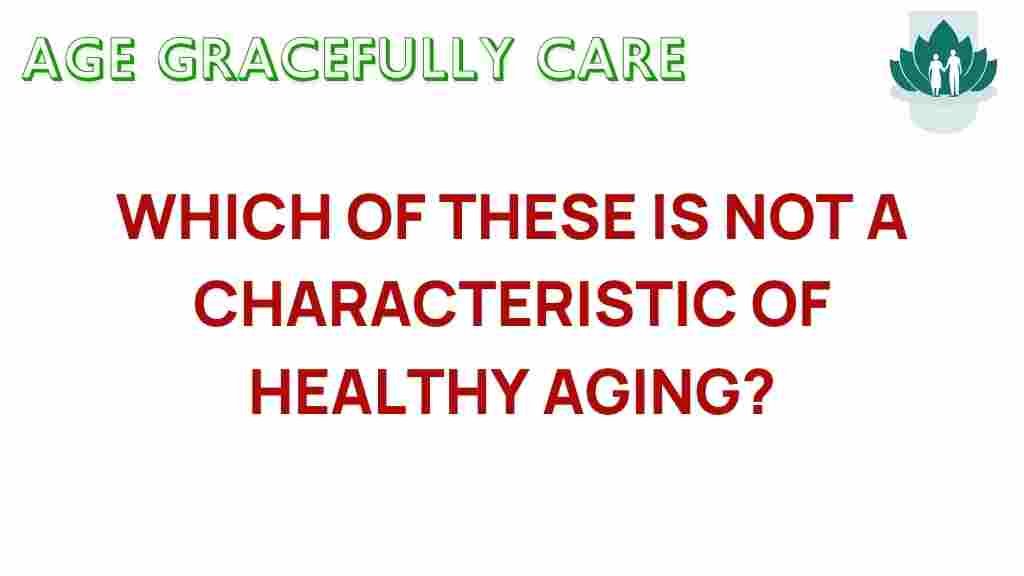Healthy Aging: Unraveling the Myths
Aging is a natural part of life, yet it often brings with it a slew of misconceptions that can skew our understanding of the aging process. The concept of healthy aging is frequently misunderstood, leading to myths that can hinder our approach to wellness and longevity. In this article, we will explore the common myths surrounding healthy aging, debunk these misconceptions, and provide practical health tips to promote a vibrant, fulfilling life as we age.
Understanding Healthy Aging
Before diving into the myths, it’s essential to define what healthy aging truly means. Healthy aging refers to the process of developing and maintaining the functional ability that enables well-being in older age. It encompasses physical, mental, and social well-being, allowing individuals to lead an active, fulfilling life.
As we age, our bodies undergo various changes that can affect our health and lifestyle. However, it is crucial to recognize that aging does not equate to declining health. With the right mindset and lifestyle choices, individuals can enjoy a long, healthy life.
Common Myths About Healthy Aging
Now, let’s explore some of the most prevalent myths about healthy aging:
- Myth 1: Aging Means Declining Health
- Myth 2: You Can’t Teach an Old Dog New Tricks
- Myth 3: All Older Adults Are Lonely
- Myth 4: You Can’t Control How You Age
- Myth 5: Supplements Are Necessary for Healthy Aging
One of the most pervasive misconceptions is that aging automatically leads to poor health. While it is true that certain health issues become more common with age, many older adults maintain excellent health through active lifestyle choices.
Another myth is the idea that older adults cannot learn new skills or adapt to new technology. In reality, the brain remains capable of learning throughout life, and engaging in new activities can enhance cognitive function.
While social isolation can be an issue for some seniors, many older adults maintain robust social networks and active social lives. Building and sustaining relationships is vital for emotional health.
Many people believe that aging is entirely genetic and beyond their control. However, lifestyle choices such as diet, exercise, and stress management play a significant role in the aging process.
While some supplements can be beneficial, many people overestimate their necessity. A balanced diet rich in nutrients is typically sufficient for most older adults.
Strategies for Healthy Aging
Understanding the myths is only the first step. To truly embrace healthy aging, consider the following strategies:
1. Maintain a Balanced Diet
Nutrition plays a crucial role in the aging process. A balanced diet should include:
- Fruits and vegetables
- Whole grains
- Lean proteins
- Healthy fats
Consider incorporating foods rich in antioxidants and omega-3 fatty acids, as they support brain health and reduce inflammation.
2. Stay Physically Active
Regular physical activity is essential for maintaining muscle mass, flexibility, and cardiovascular health. Aim for at least:
- 150 minutes of moderate aerobic activity each week
- Strength training exercises twice a week
Choose activities you enjoy, such as walking, swimming, or yoga, to make exercise a regular part of your routine.
3. Prioritize Mental Health
Engaging in activities that stimulate the mind can combat cognitive decline. Consider:
- Reading books or articles
- Playing puzzles or board games
- Learning a new language or instrument
Meditation and mindfulness practices can also enhance emotional well-being and reduce stress.
4. Foster Social Connections
Maintaining social ties is vital for emotional health. Here are a few ways to connect:
- Join clubs or groups that share your interests
- Volunteer for community service
- Stay in touch with family and friends through regular calls or visits
5. Regular Health Check-Ups
Routine health screenings can help detect potential health issues early. Stay proactive with:
- Annual physical exams
- Regular dental and vision check-ups
- Screenings for chronic conditions such as diabetes and hypertension
Troubleshooting Common Aging Concerns
As you embark on your journey of healthy aging, you may encounter common issues that can affect your overall wellness. Here are some troubleshooting tips:
Dealing with Declining Energy Levels
If you notice a decrease in your energy, consider the following:
- Review your diet: Ensure you are consuming enough nutrients to fuel your body.
- Adjust your sleep schedule: Aim for 7-9 hours of quality sleep each night.
- Engage in regular physical activity: Even light exercise can boost energy levels.
Combatting Cognitive Decline
If you are concerned about memory or cognitive function:
- Stay mentally engaged with puzzles, reading, or learning.
- Maintain social interactions to stimulate cognitive function.
- Consider discussing any concerns with a healthcare professional.
Managing Stress and Anxiety
If you find yourself feeling stressed or anxious:
- Practice relaxation techniques such as deep breathing or meditation.
- Engage in physical activity to release endorphins.
- Talk to someone you trust about your feelings.
Conclusion: Embracing Healthy Aging
As we have explored, healthy aging is surrounded by numerous myths and misconceptions. By debunking these myths and embracing a proactive approach to wellness and longevity, individuals can lead fulfilling lives well into their later years. Remember, the aging process is not a decline but rather an opportunity to thrive.
To learn more about living a healthy lifestyle as you age, check out this comprehensive guide. For more information on wellness strategies, consider visiting the World Health Organization’s website for resources on healthy aging.
By adopting the right lifestyle choices, you can ensure that your golden years are as vibrant and enjoyable as possible. Embrace the journey of healthy aging, and let go of the myths that hold you back!
This article is in the category Health and created by AgeGracefullyCare Team
